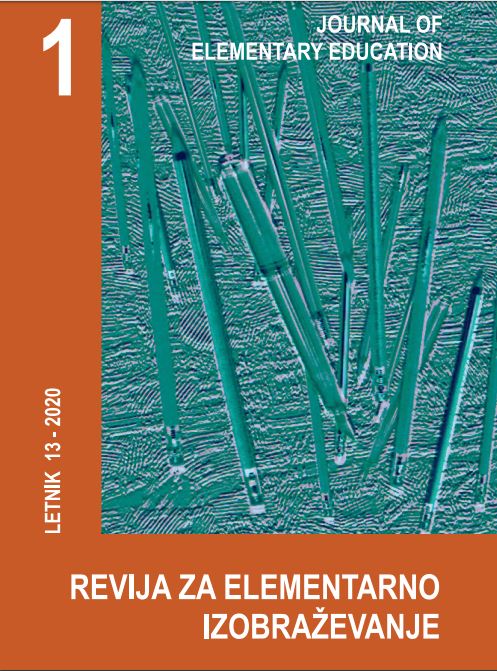The impact of online learning on student motivation in science and biology classes
Povzetek
Vpliv spletnega učenja na motivacijo učencev pri naravoslovju in biologiji. Cilj raziskave je preveriti razlike v učni motivaciji med učenci, ki se učijo z uporabo spleta, in učenci, ki so udeleženi v sodobnem poučevanju. Udeleženci v raziskavi so bili učenci od 5. do 8. razreda, na osnovi predhodnega testiranja razdeljeni v eksperimentalno skupino (pouk z uporabo komunikacijske tehnologije) in kontrolno skupino. Rezultati kažejo, da med testiranima podvzorcema ni statistično pomembnih razlik v motivaciji. Motivacija učencev za učenje naravoslovja upada z leti šolanja, vendar to ni statistično pomembno. Sklepamo lahko, da je učenje naravoslovja in biologije z uporabo komunikacijske tehnologije kot orodja za učenje lahko enako motivacijsko kot pouk z uporabo aktivnih metod poučevanja.
Prenosi
Literatura
Ames, C. (1992). Classrooms: Goals, structures, and student motivation. Journal of educational psychology, 84(3), 261.
Bandura, A. (1986). Social foundations of thought and action: A social cognitive theory. Englewood Cliffs, NJ. Prentice-Hall.
Bolliger, D. U., & Martindale, T. (2004). Key factors for determining student satisfaction in online courses. International Journal on E-learning, 3(1), 61–68.
Bratina, T. (2012). Multimedijska učna gradiva in izbira strategij reševanja problemov pedagoškega raziskovanja.
Doktorska disertacija. Maribor: Univerza v Mariboru, Pedagoška fakulteta.
Brumen, M., Krušič, H., & Zupančič, T. (2017). Uporaba informacijsko-komunikacijske tehnologije pri poučevanju in učenju angleščine v otroštvu. Revija za elementarno izobraževanje, 10(4), 427–443.
Bulić, M., Jelaska, I., & Jelaska, P. M. (2017). The Effect of E-learning on the Acquisition of Learning Outcomes in Teaching Science and Biology. Croatian Journal of Education-Hrvatski časopis za odgoj i obrazovanje, 19(2), 447.
Bulić, M., & Kostović Vranješ, V. (2019). The Impact of E-Learning on Student Selfresponsibility in Doing Their Homework.Školski vjesnik: časopis za pedagogijsku teoriju i praksu, 68(1), 127–140.
Butler, R. (2014). Motivation in educational contexts: Does gender matter?. In Advances in child development and behavior (Vol. 47, pp. 1–41). JAI.
Carlone, H. B. (2004). The Cultural production of Science in reform-based Physics: Girls' Access, Participation and Resistance. Journal of Research in Science Teaching, 41(4), 392–414.
Dahlstrom, E., Brooks, D. C., & Bichsel, J. (2014). The current ecosystem of learning management systems in higher education: Student, faculty, and IT perspectives. Research report. Louisville, CO: ECAR, September 2014. Retrieved from http://www.educause.edu/ecar
Deci, E. L., & Ryan, R. M. (1985). Cognitive evaluation theory. In Intrinsic motivation and selfdetermination in human behavior (pp. 43–85). Springer, Boston, MA.
Glynn, S. M., & Koballa, T. R. (2006). Motivation to learn in college science. Handbook of college science teaching, 25, V32.
Güvercin, O., Tekkaya, C., Sungur, S. (2010). Across age study of elementary students' motivation towards science learning. Hacettepe University Journal of Education, 39, 233–243.
Glynn, S. M., Taasoobshirazi, G., & Brickman, P. (2009). Science motivation questionnaire: Construct validation with nonscience majors. Journal of Research in Science Teaching: The Official Journal of the National Association for Research in Science Teaching, 46(2), 127–146.
Jenkins, E. W. (2005): Important but not for me: students' attitudes towards secondary school science in England. Research in Science & Technological Education, 23(1), 41–57.
Liaw, S. S., & Huang, H. M. (2013). Perceived satisfaction, perceived usefulness and interactive learning environments as predictors to self-regulation in e-learning environments. Computers & Education, 60(1), 14–24.
Molenda, M. (2003). In search of the elusive ADDIE model. Performance improvement, 42(5), 34–37.
Novoselić, D., Bulić, M. & Bastić, M. (2014). Eight Graders' Motivation for Knowledge Acquisition of Elementary School Biology. Modern Approaches to Teaching the Coming Generations (pp. 272– 281). Eduvision International Conference, Ljubljana, Slovenia.
Osborne, J. & Collins, S. (2001). Pupils’ views of the role and value of the science curriculum: a focusgroup study. International Journal of Science Education, 23(5), 441–467.
Pajares, F. & Schunk, D. H. (2001). Self-neliefes and school succes: Self-efficacy, self-concept and school achivment. In r. Riding & s. Rayner (Eds.). London: Ablex Publishing.
Pintrich, P. R. (2003). A motivational science perspective on the role of student motivation in learning and teaching context. Journal of Education Psychology, 95, 667–686.
Rheinberg, F. (2004). Motivacija. Naklada Slap, Jastrebarsko.
Sanfeliz, M., Stalzer, M. (2003). Science motivation in the multicultural classroom. The Science Teacher, 70 (39), 64–66.
Vizek Vidović, V., Rijavec, M., Vlahović-Štetić, V., & Miljković, D. (2003). Psihologija obrazovanja. IEP.
Violante, M. G., & Vezzetti, E. (2015). Virtual interactive e-learning application: An evaluation of the student satisfaction. Computer Applications in Engineering Education, 23(1), 72–91. https://doi.org/10.1002/cae.21580
Wei, H. C., Peng, H., & Chou, C. (2015). Can more interactivity improve learning achievement in an online course? Effects of college students’ perception and actual use of a coursemanagement system on their learning achievement. Computers & Education, 83, 10–21. https://doi.org/10.1016/j.compedu.2014.12.013
Copyright (c) 2020 University of Maribor

To delo je licencirano pod Creative Commons Priznanje avtorstva 4.0 mednarodno licenco.
